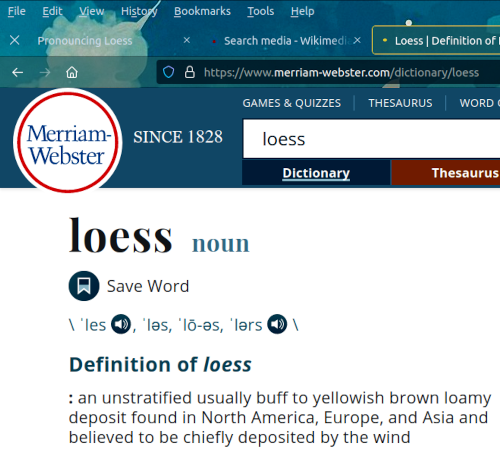 Screenshot of part of Merriam-Webster web page addressing pronunciation of 'loess'
Screenshot of part of Merriam-Webster web page addressing pronunciation of 'loess'The short answer is that you can take your pick between pronouncing it like "LERSS," or "LUSS," or like "LOW-ess." However, there's more to it than that, so here's the longer answer:
The word "loess" is taken directly from German, because loess was first scientifically studied in Germany. In German the word is written Löß, so even our spelling of "loess" has a shaky history.
In German, Löß is pronounced in a manner requiring that the tongue and lips be curled into a configuration which no native English speaker can manage without a great deal of practice. Usually English-speaking scientists and teachers shoot in the general direction of the German pronunciation, but basically miss the mark. They often say LERSS. That's what I called it before I learned German, but back then when I mentioned "lerss" to native German speakers who knew all about Löß, "LERSS" was not understood.
Geologists, at least Southern ones, have been heard pronouncing it like "LUSS." That's not as close to the German as LERSS but it's way better than LOW-ess and it's easy for an American to say.
Many people pronounce loess the way it's printed -- LOW-ess. But that's like pronouncing the word "island" like "IS-land" or calling Des Moines, Iowa "DEZ-mo-NEZ." However, so many people say LOW-ess that in dictionaries it's often mentioned as an acceptable pronunciation. On the Natchez Trace there's actually a loess-bluff exhibition with a board claiming that that's the way it's pronounced, over and out!
Other pronunciations have been heard coming from the mouths of reputable people, and probably their sounds are as good an any.
Therefore, this word "loess" is about the most clumsy thing that could have happened to us, but we're stuck with it. We toyed with the idea of calling our zone the "Cane Hills," which has historical precedence, and maybe we should have. However, in the end the thing that makes our zone special is its loess and not its cane.
So, LERSS, or LUSS, or even LOW-ess, if you have to. And if someone else calls it another way, don't bother to correct them.